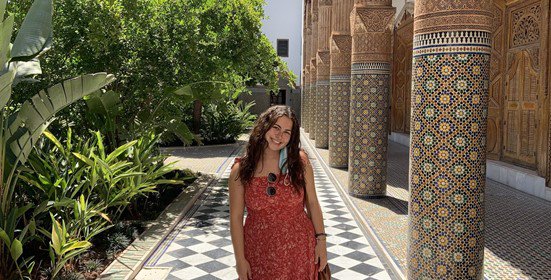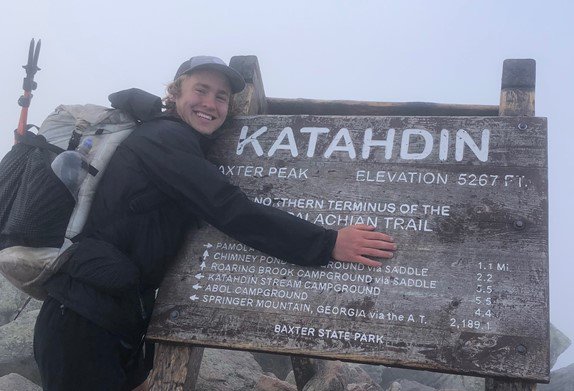Silver Linings of an Unexpected Pandemic Gap Year
How a gap year thrown off course by the pandemic became a path to self-discovery and resilience.
Peyton Klein and Robert Lawrence are both 2019 Bezos Scholars and will be freshmen at Stanford and Harvard, respectively, this fall. Peyton has an infectious curiosity, asks great questions, and loves to connect with people, especially those different than herself. Robert has a warm and calm demeanor, approaches problem-solving wisely, and always engages with respect and a certain “southern charm.”
During their time as Scholars, Peyton and Robert became close friends. After graduating high school in 2020, they coincidentally decided to each defer their enrollment to university and embark on taking an unexpected gap year in response to the Covid pandemic and its impacts on them as prospective first year college students. The past year forced both outside of their comfort zones. Below, they reflect about how they responded to the pandemic, uncertainty, being pushed off the paths they thought they would be on—and what they learned from their unexpected and perspective-changing journeys.
Peyton
In April of 2020, as the devastation of the COVID-19 pandemic raged, I decided to defer my enrollment at Stanford in the hopes of being able to have a more traditional in-person college experience. I shifted my focus, considering how I could become involved in pandemic relief, safely contribute, and find purpose amidst the ongoing crisis. On a whim, 15 minutes before the deadline, I applied to Americorps and was accepted as a Summer Associate. That June, I traveled to White Sulphur Springs, Montana, arriving in a town of 900 with sprawling fields and a grocery store that operated on the honor system—a radical change of pace from my native Pittsburgh. I worked at the Steven’s Youth Center, supporting summer programming for low-income and native youth. On the weekends, I went camping with my coworkers, falling in love with the great outdoors.
Those days in Montana’s national parks, and my hesitant adjustment to life’s slower pace, motivated me to enroll in an Outward Bound course—pushing my physical and mental limits while exploring the Boundary Waters region of northern Minnesota. I trekked 12 miles a day with 80 pounds on my back going a month without a shower, a change of clothes, or dark chocolate. Through this challenge, I found truth in cliches: what (mountains) go up must come down, don’t judge a person until you’ve walked a mile in their hiking books, and, above all, you are stronger than you know. I had time to reflect on my relationships, priorities, and goals while finding a new sense of mindfulness amid constant obstacles.
Seeking out a contrasting academic experience, I enrolled in Kivunim, a year-long academic program focused on studying Arabic, Hebrew, geopolitical conflict, and the Jewish diaspora. In many ways, this year has been an exploration of my identity—studying my Jewish heritage felt like a natural step. With a generous scholarship, I relocated to Jerusalem to hear both Jewish and Arab Israelis, as well Palestinians, share their different life experiences and struggles. I listened to all opinions, questioned every side, and absorbed the weight of my environment. Most importantly, I felt uncomfortable, interrogating my own identity and challenging myself to develop an opinion strong enough to turn into action.
And then, on May 6th, 2021, tensions erupted between Israel and Gaza. Amidst bomb sirens and lockdown orders I was again planless but safe despite great upheaval. I returned home for a few days of reflection and necessary repacking prior to the spontaneous and intensive travel that took us to study the Jewish diaspora in Greece, Morocco, the Czech Republic, and Germany, yet there was no guarantee of what was ahead.
This year I have internalized the idea that routine is the enemy of time. Regimen is easy, uncertainty is hard. Spontaneity, chance and the unknown are what make time stop. I am profoundly lucky to say that this year has been an opportunity to chase life as I am making plans. I feel incredibly grateful to the Bryan Cameron Impact Scholarship and the Diller Family Foundation for giving me the flexibility to move away from my day-to-day to do something adventurous in this time of hardship for so many.
Now, settling back into life in the states and preparing to start at Stanford, I am grappling with the fact that my pre-COVID normal is gone forever. I am tasked with approaching each day individually and the knowledge that plans are aspirational, but never certain. As I embark on this new chapter, moving my life over 2600 miles away from home, I am equipped with the necessary flexibility, growing sense of self, and renewed curiosity that will allow me to make the most of my college experience.

Robert
Spurred by the nature of Covid and a neglected outdoorsman spirit, I began my gap year by embarking on a solo backpacking trip along the John Muir Trail in the Sierra Nevada. Mostly alone among towering granite peaks, the isolation I felt was hard to ignore. Yet, I was innately connected to a part of myself that had long been buried by high school obligations. To say I walked away from the High Sierra ready to embark on a longer trip would be disingenuous; however, I found backpacking began to ensnare my thoughts towards occupying the rest of the year. After a few weeks at home, I connected with a farm in rural Maine through WWOOF and decided to work there as the trees turned to fiery hues with the changing seasons. It was on several autumn weekend camping trips while in Maine that my desire to backpack a long-distance trail, specifically the Appalachian Trail, truly solidified.
Several months later that desire had come to fruition, and I found myself on the precipice of another dramatic change of pace—walking over 2,100 miles. On March 2, 2021, I stepped out into the crisp air of northern Georgia and started walking alone toward Maine. I hadn’t slept much the night before, questioning whether I actually wanted to hike the Appalachian Trail or if it was a desperate attempt to fill up my abnormally empty calendar. While the trail had captivated my wanderlust several years prior when reading Bill Bryson’s A Walk in the Woods, the stark realities of a nomadic life had quickly lost their romantic sheen. That first day I resolved to delay any further analysis of my motivations and to simply focus on walking for a few hundred miles.
The next 110 days followed a rather simplistic regiment: wakeup, eat, pack up, hike, eat, hike, setup camp, eat, sleep. I carried my world within my backpack, always contemplating what I could get rid of next to reduce the amount of weight I had to carry. Gradually, I began to appreciate the newfound freedom that came with my solitary purpose, to walk north. While this purpose also meant continuing forward, despite the steep climbs, rocky trails, all-day storms, and irksome insects, it pushed me to grow comfortable in living amidst uncertainty. I learned to laugh at storms that left me soaked through and then to subsequently stop everything when the first breaks of sunlight came to dry my skin. Nature, the most unpredictable of forces, strengthened my resilience.

In late June when I stood atop Mount Katahdin, the southern terminus of the trail, I was met with a dense fog. A previous me would have been crushed by the lack of a sweeping vista, but instead the swirling grey vortex compelled me towards reflection. My gap year had inverted the environment I was comfortable in and challenged me to thrive—in turn altering how I define myself and what I value. Now, as I enter college, I am less sure of what I want to achieve, yet more sure of my ability to do so.
Gratitude to Peyton and Robert, for working on this story together, and for sharing their reflections, journeys, wisdom, and lessons with us.